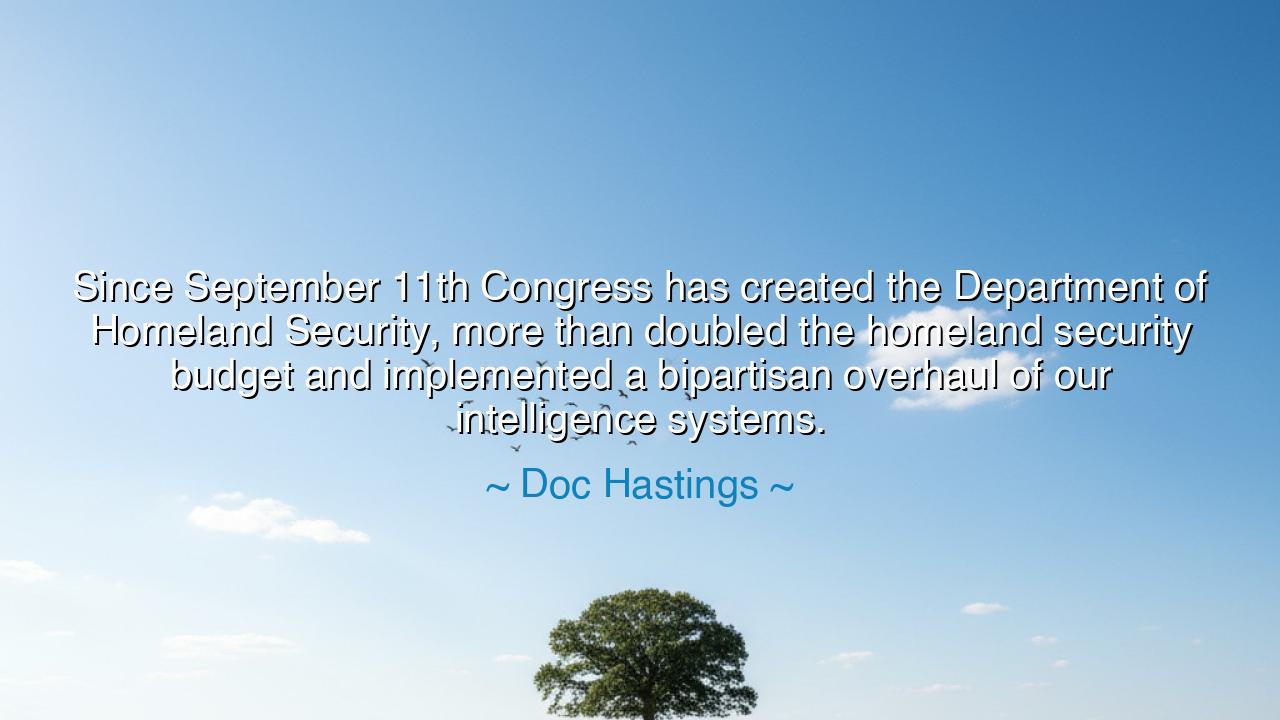
Since September 11th Congress has created the Department of
Since September 11th Congress has created the Department of Homeland Security, more than doubled the homeland security budget and implemented a bipartisan overhaul of our intelligence systems.






"Since September 11th, Congress has created the Department of Homeland Security, more than doubled the homeland security budget, and implemented a bipartisan overhaul of our intelligence systems," said Doc Hastings, and in these words, we find both the weight of tragedy and the resolve of a nation determined to protect its people. The events of that fateful day marked a turning point in history, an awakening to vulnerabilities that had long been ignored, and a solemn reminder of the fragility of life. In the aftermath, the United States found itself at a crossroads, forced to confront the threats that could harm its citizens and change the course of its future. What followed was not just a response, but a profound shift in how the nation would secure its future.
The creation of the Department of Homeland Security was a symbolic and practical response to an unprecedented attack. It represented not only a change in strategy but a reimagining of how security and intelligence should be approached. The establishment of this department unified multiple agencies under one banner, bringing together the resources, knowledge, and manpower necessary to face threats that no single agency could tackle alone. It was a move grounded in the understanding that unity and cooperation would be essential in a world that had become more interconnected and unpredictable. The lesson here is clear: in the face of overwhelming adversity, it is not enough to act alone; strength lies in collaboration and the willingness to pool resources for the greater good.
The decision to more than double the homeland security budget speaks to the scale of the challenge the country faced. In the face of rising threats, the nation chose to invest heavily in its own defense, not just in terms of military might, but in intelligence, cybersecurity, and emergency preparedness. This act of commitment symbolizes the belief that security is not just the responsibility of a few, but of a nation. It is a reminder that safeguarding the future requires sacrifices in the present. In the same way, Rome fortified its borders and secured its empire through wise investment in its military and defenses, so too must we fortify our own lands, even when the cost seems high.
The bipartisan overhaul of the intelligence systems was an acknowledgment that, despite the efforts of individual agencies, the system had failed to prevent the tragedy of September 11th. This overhaul was not simply a technical adjustment but a shift in the philosophy of intelligence gathering and analysis. It brought together different political factions, recognizing that the division between them could no longer take precedence over the need for national security. This commitment to a unified approach, in the face of global and domestic challenges, serves as a powerful reminder that national unity—especially in times of crisis—holds the key to long-term security and prosperity.
Consider, for example, the example of Winston Churchill during World War II. Faced with a threat greater than most could imagine, Churchill understood the importance of rallying his nation and its allies to confront the enemy. His leadership was marked not only by strength and resolve but by the ability to bring together disparate groups under a single vision. Similarly, in the aftermath of 9/11, the United States, under its leaders and through Congress, sought not only to secure its borders but to unite its people against an unseen enemy. This unity, forged in the crucible of tragedy, became the cornerstone of the nation's response.
In the end, Doc Hastings’ words carry with them a deeper lesson: that in moments of crisis, a nation must act swiftly and decisively. The establishment of the Department of Homeland Security and the doubling of the homeland security budget were not merely reactive measures—they were forward-thinking strategies designed to protect the future from the threats of today. And the overhaul of the intelligence system serves as a reminder that systems—whether governmental, societal, or personal—must constantly evolve in order to address new realities.
Let us take these lessons to heart. When confronted with great challenges, whether in our own lives or within our communities, we must remember the importance of unity, the necessity of resource investment, and the commitment to adaptation. The creation of the Department of Homeland Security and the investment in security were not actions taken out of fear but out of resolve and wisdom. They were decisions made by those who understood that to ensure a better tomorrow, we must be willing to change and sacrifice today. In our own lives, when faced with adversity, let us remember that true strength lies not only in resilience but in our ability to adapt, to come together, and to build a future secure in the knowledge that we have done all that we can to protect it.






AAdministratorAdministrator
Welcome, honored guests. Please leave a comment, we will respond soon